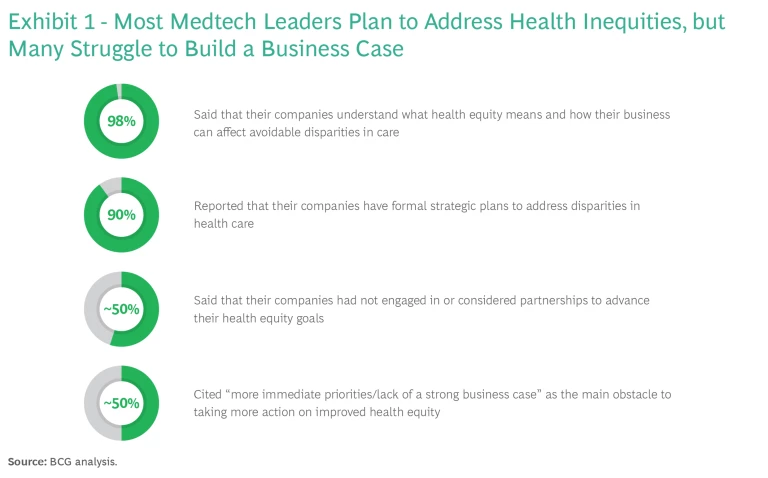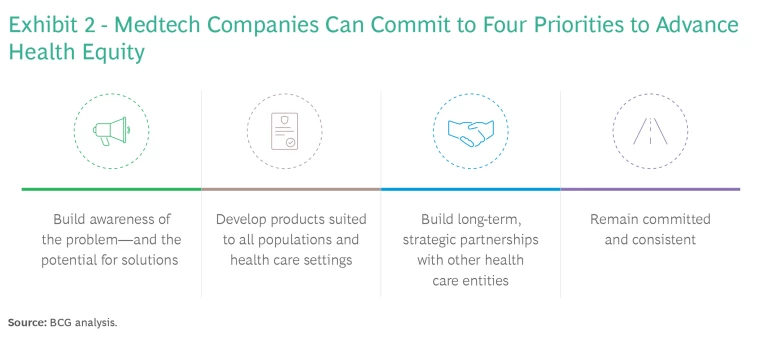Listen to this article
Medtech companies increasingly recognize the need to address inequities in health care , and they are taking action to do so. In a recent BCG survey at top medtech firms, 90% of senior leaders reported that their companies have strategic plans to address the issue.
Of course, health disparities stem from many factors—including socioeconomic and environmental conditions, as well as the quality and availability of health care—and no industry or organization can solve the problem on its own. But medtech companies can play a significant role in identifying disparities and creating equitable solutions. Diagnostics companies, in particular, have a unique opportunity to mitigate health inequities because their engagement with patients begins early in the health care journey. For instance, by ensuring that underserved communities have access to affordable, timely testing, these companies can detect risk factors and offer early diagnoses, helping vulnerable patients avoid the costly and complex treatments that would be required if their diseases progressed.

The challenge is that companies sometimes struggle to build a clear business case for these efforts. (See Exhibit 1.) To overcome this obstacle, medtech companies need to adopt a broader definition of business value, looking beyond immediate financial impact to such benefits as enhanced employee engagement, a stronger value proposition for purpose-driven talent, access to new markets and customers, and deeper engagement with investors, along with benefits to communities and society. Then, to be effective in their efforts to advance health equity, they need to raise awareness of the problems and potential solutions, develop products that are suitable for diverse patients and health systems, forge strategic partnerships for greater impact, and consistently prioritize equity as a core business priority.
Understanding Health Inequities in Medtech
The World Health Organization defines health equity as the absence of unfair, avoidable, or remediable differences in people’s health and well-being. Health inequities can exist among countries (for example, between higher-income and lower-income countries) or across different populations within a country (such as between rural and urban populations).
Health disparities have many causes, but the medtech industry may contribute to them in four principal ways:
- Products Not Adapted to All Patients or Health Systems. Medtech solutions are sometimes designed, tested, and deployed without factoring in the needs of different patient populations or health systems. For example, a 2022 study looked at pulse oximeters in the US. These devices—which use light to measure oxygen saturation in the blood—overestimated the level of arterial oxygen saturation in Asian, Black, and Hispanic patients compared with white patients. As a result, nonwhite COVID patients were not accurately diagnosed and their treatment was delayed.
- Products Not Accessible to All Patients. Consider the global distribution of COVID-19 diagnostic tests. By mid-2021, only 0.4% of 3.2 billion COVID-19 tests worldwide had been administered in low- and middle-income countries, even though 75% of the global population lives in those regions. This gap has since narrowed, but in 2023, still only 35% of COVID tests were administered in these countries.
- Products Not Affordable for All Patient Populations. Medtech solutions that are common in some countries are prohibitively expensive in others. A survey conducted in over 50 low- and middle-income countries showed that even in urban hospitals, the primary barrier to the use of ultrasound machines—which are essential and have been widely used in high-income countries for decades—is high cost.
- Products Not Adopted by All Populations. Some medtech solutions see inequitable adoption rates across populations—sometimes even within the same country or market. For instance, a large US study conducted in specialized diabetes clinics found that Black adults were significantly less likely to use continuous glucose monitoring devices than non-Black adults (8% versus 30%). They were also less likely to be prescribed these devices by their providers.
Understanding these sources of health inequities can help medtech companies identify opportunities to improve—particularly in addressing those inequities to which they may inadvertently be contributing.
Expanding the Definition of Value
Our survey revealed a clear consensus among medtech leaders on the need to advance health equity—and the need to act now. An overwhelming 98% of respondents said that they understand the impact their business can have on health inequities. Moreover, 90% reported that their companies have some formal strategic plans to address them. However, companies face challenges in executing these plans. In our survey, respondents cited “more immediate priorities/lack of a perceived business case” as the biggest obstacle to investing in improved health equity.
Committing to health equity is more than a social responsibility. It is a strategic decision that offers economic benefits and an opportunity for differentiation in the market. For businesses to fully tap into these benefits, they need to expand their definition of value to include the diverse and long-term gains of health equity initiatives. This means generating more comprehensive business cases that look at new measures of impact and success, in addition to traditional financial indicators. Benefits that such comprehensive business cases might produce include the following:
- Attraction and Retention of Talent. Setting and achieving health equity goals can help companies differentiate themselves in the marketplace for talent, attracting top candidates for open positions and engaging and retaining current employees. A growing share of the workforce values corporate responsibility and a commitment to social issues. In a 2021 BCG survey , 63% of all US workers said the issue of diversity and inclusion had become more important to them since 2019; the share was even higher for workers younger than 30 (72%).
- Access to New Markets and Customers. Providing products and services to currently underserved communities helps medtech companies gain access to potential new customers. This can improve both their ability to serve and their cost to serve customers—for instance, through opportunities to cross-sell and gain share. Further, developing products for a broader set of markets gives companies experience with diverse regulatory environments and can lead to strategic local partnerships in support of R&D or other business functions.
- Improved Investor Relations. As ESG becomes more important to investors, a strong commitment to health equity can help medtech companies build stronger relationships with existing investors and attract new investors.
- Compliance with Evolving Regulations. Regulators are increasingly adopting a health equity lens, and a proactive stance will not only help companies meet compliance requirements but also capture other advantages. In the US, the 2022 Diverse and Equitable Participation in Clinical Trials (DEPICT) Act exemplifies this shift (it requires that companies applying for US Food and Drug Administration approval of a new drug or medical device submit a plan for enrolling diverse patient populations in clinical trials). Similarly, the Department of Health and Social Care in the UK—through the Health Research Authority and the Medicines and Healthcare products Regulatory Agency—is working to improve the diversity of participants in scientific and clinical research. Further, the US FDA has broadened eligibility for its Breakthrough Devices Program to devices that advance health equity, providing a means to expedite the development and authorization of these devices.
In addition to these benefits for individual companies, improving health equity benefits people, their communities, and society at large.
Translating Awareness into Action
Advancing health equity requires making products that are adapted to, accessible to, affordable by, and adopted by everyone who can benefit from them. Success requires clear commitment from leadership on four key priorities. (See Exhibit 2.)

Build awareness of the problem—and the potential for solutions. Medtech companies first need to assess how their products and business processes may contribute to health inequities. Once they have established this baseline of current performance, they can set specific goals for future efforts—including their geographic focus and intended impact—in line with their enterprise strategy. Again, this involves adopting a comprehensive view of both financial and nonfinancial measures of success.
Several companies are not just taking action in their own organizations but are also improving awareness of health disparities in their work with providers, patients, and other stakeholders. Such initiatives have shown that using data to shine a light on existing inequities, and to identify tactical solutions tailored to a given community, is crucial to driving measurable impact.
Develop products suited to all populations and health care settings. Companies should integrate health equity as a priority across all business functions and along the entire product life cycle—starting with R&D. Portfolios should include products that meet the needs of underserved populations and markets. Equity principles should be incorporated into product design, and clinical-trial patient pools should be as diverse as the populations that will employ the company’s products. All of this will require a deep understanding of the communities that companies are looking to serve—achieved through ethnographic research, partnering with key stakeholders in the community, or other methods.
Over the past decade, several companies have prioritized equity across their product portfolios. One company established a department to monitor its clinical trials and ensure diversity among study participants. Companies are also integrating accessibility, affordability, and other equity-related factors as foundational design principles for their products. For instance, one company developed an affordable maternal-health solution that could be administered by midwives and nonexpert providers in low-income settings.
Build long-term strategic partnerships with other health care entities. Medtech companies can increase the reach and impact of their efforts by forging strategic partnerships with stakeholders in the health care ecosystem, including providers, government organizations, nonprofits, advocacy groups, and community organizations. Partnerships are a particularly powerful lever, yet it is one that many companies overlook. In our survey, only 50% of senior medtech leaders said that their companies have considered collaborating on health equity initiatives.
The companies that are engaging partners are tackling different aspects of health inequity and overcoming specific challenges. One medtech company’s partnership with a philanthropic organization provided the necessary capital to develop a cost-effective medtech solution for low-income countries. Another company worked alongside governments and public-health organizations to increase access to its diagnostic kit, supporting the development of policies that would ensure its availability in the most vulnerable communities. Similarly, companies can collaborate with hospital systems to track the adoption of medtech products and establish processes to support their equitable uptake across communities.
It’s important to note that it is not sufficient to engage in one-off partnerships for individual projects. Large-scale, enduring partnerships are essential to driving and sustaining impact in the long term.
Remain committed and consistent. Improving health equity is a long race with no finish line. It should be a core priority for medtech companies, embedded into core business functions and practices so that it doesn’t get dropped or deprioritized as external market conditions or internal priorities shift. Goals should be public, leadership teams should be held accountable for progress, and results should be disclosed in annual reports and other communications.
Companies will inevitably experience both successes and setbacks, but neither should be determinative. Sustained impact requires persistent efforts and a commitment to growing and scaling efforts over time. Medtech leaders need to look beyond the results of individual initiatives and remain focused on long-term success—setting clear objectives, tracking progress and impact in creative ways, and learning from each experience.
Most medtech executives get into the field because they want to make a meaningful difference in the world. While they have an imperative to generate financial returns, that isn’t their sole objective. By taking effective steps to improve health equity, leadership teams can improve the lives of millions—while also generating business benefits for their organization. It’s not easy, but it is attainable. Moreover, it’s the right thing to do.










